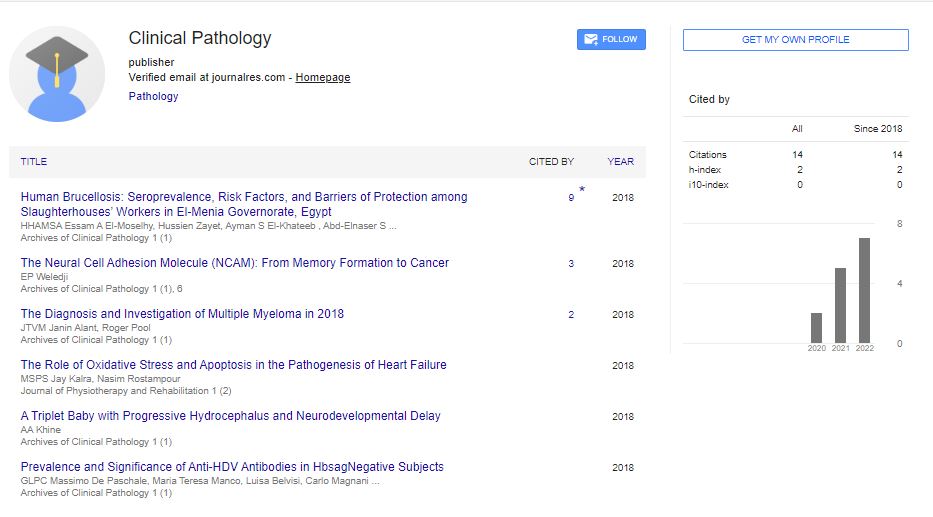Perspective, Arch Clin Pathol Vol: 6 Issue: 4
Hematological Horizons: Innovations and Insights in Clinical Practice
Glenn Adam*
1Department of Hematology, Centre Henri Becquerel, Rouen, France
*Corresponding Author: Glenn Adam,
Department of Hematology, Centre Henri
Becquerel, Rouen, France
E-mail: glennadam@gmail.com
Received date: 27 November, 2023, Manuscript No. ACPY-24-124237;
Editor assigned date: 29 November, 2023, PreQC No. ACPY-24-124237 (PQ);
Reviewed date: 13 December, 2023, QC No. ACPY-24-124237;
Revised date: 21 December, 2023, Manuscript No. ACPY-24-124237 (R);
Published date: 29 December, 2023 DOI: 10.4172/acpy.100101
Citation: Adam G (2023) Hematological Horizons: Innovations and Insights in Clinical Practice. Arch Clin Pathol 6:4.
Description
Clinical hematology is a specialized field within medicine focused on the study, diagnosis, and treatment of blood disorders and hematological malignancies. Blood, a vital fluid in the human body, comprises various cellular components, including red blood cells, white blood cells, and platelets, along with plasma. Clinical hematology delves into the understanding of blood cell production, functions, and their alterations in disease states. Hematopoiesis, the process of blood cell formation, occurs in the bone marrow and involves the differentiation of hematopoietic stem cells into mature blood cells. Red blood cells (erythrocytes) transport oxygen, white blood cells (leukocytes) play a crucial role in immune responses, and platelets (thrombocytes) aid in blood clotting.
Blood disorders encompass a wide spectrum of conditions, including anemia, leukemia, lymphoma, myeloma, bleeding disorders, and clotting abnormalities. Hematological malignancies arise from abnormalities in blood cell production, leading to uncontrolled proliferation and disturbances in normal blood cell function.
Methodologies in clinical hematology
Diagnostic approaches in clinical hematology involve a combination of laboratory tests, microscopic examination, and specialized techniques. Complete Blood Count (CBC) assesses the cellular components of blood, providing information about red blood cells, white blood cells, and platelets counts, along with their indices.
Peripheral blood smears, stained and examined under a microscope, allow visual assessment of blood cell morphology, identifying abnormalities in size, shape, and structure. Flow cytometry, a technique utilizing fluorescently-labeled antibodies, aids in analyzing cell surface markers and identifying abnormal cell populations in hematological malignancies.
Role in disease diagnosis and management
Clinical hematology plays a pivotal role in diagnosing and managing various blood disorders. Anemia, characterized by reduced red blood cells or hemoglobin levels, can be indicative of underlying conditions such as iron deficiency, hemolytic disorders, or chronic diseases. Leukemia, lymphoma, and myeloma, classified as hematological malignancies, require precise diagnosis for appropriate treatment planning.
Hemostasis disorders, encompassing bleeding and clotting abnormalities, involve complex interactions among platelets, coagulation factors, and blood vessel integrity. Diagnosis and management of these disorders are critical to prevent bleeding complications or thrombotic events.
Emerging trends and innovations
Technological advancements continue to shape the landscape of clinical hematology. Next-Generation Sequencing (NGS) allows for comprehensive genetic profiling, aiding in the characterization of hematological malignancies and guiding targeted therapies. Molecular testing for genetic mutations, rearrangements, or chromosomal abnormalities provides crucial information for prognosis and treatment selection.
Immunotherapy, including targeted monoclonal antibodies and cellular therapies like Chimeric Antigen Receptor (CAR) T-cell therapy, shows promise in treating hematological malignancies by targeting specific antigens on cancer cells. Additionally, advancements in gene editing technologies offer potential therapeutic interventions for inherited blood disorders by correcting genetic abnormalities.
Challenges and future directions
Clinical hematology encounters challenges such as the complexity of hematological disorders, variability in disease presentations, and the need for specialized expertise in interpreting diagnostic tests. Ensuring access to advanced diagnostic technologies and optimizing treatment strategies tailored to individual patients' needs remain ongoing challenges.
The future of clinical hematology involves harnessing precision medicine approaches, integrating multi-omics data, and refining targeted therapies for blood disorders. Collaborations among hematologists, researchers, geneticists, and technologists are essential to address these challenges and drive innovations in disease understanding and personalized treatments.
Conclusion
Clinical hematology stands at the forefront of diagnosing and managing a myriad of blood disorders and hematological malignancies. Its methodologies, encompassing traditional laboratory tests to cutting-edge genetic analyses, continue to revolutionize diagnostics, treatments, and research. With ongoing technological innovations and interdisciplinary collaborations, clinical hematology holds the advancing precision medicine approaches and improving patient outcomes in the dynamic landscape of healthcare.
 Spanish
Spanish  Chinese
Chinese  Russian
Russian  German
German  French
French  Japanese
Japanese  Portuguese
Portuguese  Hindi
Hindi 